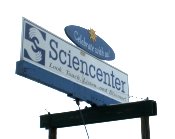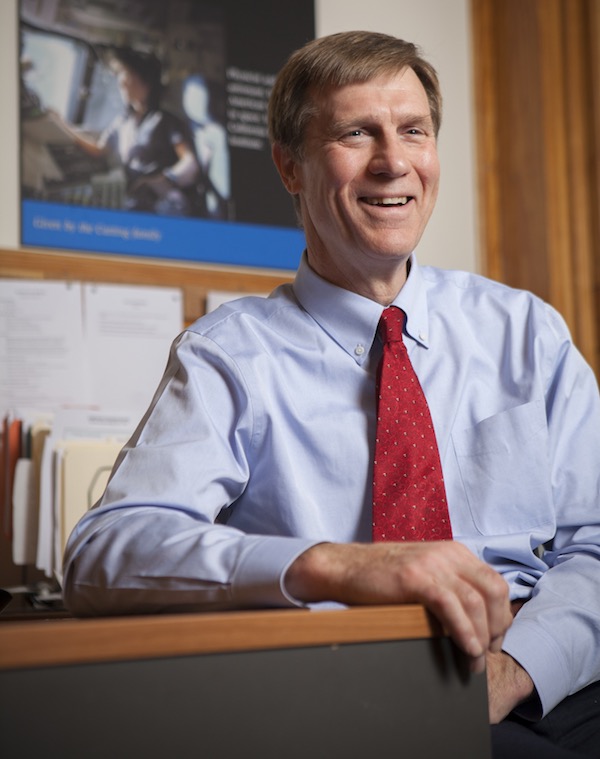- By Amy Gaulke
- Around Town
 Print
Print  After 25 years of service, Sciencenter Executive Director, Charlie Trautmann, has announced his retirement from the organization, effective spring 2017. During his tenure, Trautmann shepherded the Sciencenter from a tiny, all-volunteer, storefront venture to a vibrant, welcoming, nationally recognized institution. His leadership and focused vision helped to create a community movement dedicated to improving the region's resources and opportunities for its youth.
After 25 years of service, Sciencenter Executive Director, Charlie Trautmann, has announced his retirement from the organization, effective spring 2017. During his tenure, Trautmann shepherded the Sciencenter from a tiny, all-volunteer, storefront venture to a vibrant, welcoming, nationally recognized institution. His leadership and focused vision helped to create a community movement dedicated to improving the region's resources and opportunities for its youth.Through Trautmann's visionary leadership, the Sciencenter has grown to welcome over 100,000 guests annually and reaches over one million guests nationally through its traveling exhibitions and national programs. Over the years, the Sciencenter has established a solid reputation for growth and innovation both locally and among its peers in the international museum community. At the heart of this work has been Trautmann's passion to inspire children to learn and become excited about science and their world.
"The stars must have been in a favorable alignment when Charlie called to inquire about the position of executive director of a newly created science museum that only existed in the minds of a few enthusiastic people," says Sciencenter founders Debbie Levin and Ilma Levine. "He had faith in us and we put our faith in him. The result is a Sciencenter that the community built and that we all take pride in."
 Charlie Trautmann
Charlie TrautmannGenerations of children and their families in the region have benefited from Trautmann's leadership as he guided and shaped the Sciencenter into a community landmark offering interactive, hands-on exhibits and programs that engage, educate, and empower. He has been involved in research and public STEM education for 40 years, seeking to empower youth to use science in shaping a better future for themselves, their communities, and the world at large. Under his leadership, the Sciencenter expanded the traditional science museum family audience from the elementary years (ages 5-11) to include programs for both preschool (ages 0-5) and middle school (ages 11-14) audiences. Additionally, Trautmann has actively worked to increase museum access to families from low-income, rural, and minority backgrounds. In the last year, over 12,000 children and adults visited the Sciencenter with free or reduced-cost admissions through access programs initiated under Trautmann's direction.
"As a father, I have seen the transformative impact the Sciencenter has had on my daughter," says Sciencenter Board of Trustees Chair, Greg Galvin. "This organization has been so fortunate to have had Charlie's incredible leadership, taking it from a small storefront to a world-renown organization at the forefront of its field."
Trautmann has demonstrated extraordinary commitment to service and consistent leadership throughout the community. He helped found the Discovery Trail, serving as its Board Chair for the first six years and, with Terry Byrnes, started the Kids Discover the Trail! program. He is an adjunct professor in Cornell's School of Civil and Environmental Engineering, an enthusiastic community volunteer, and has chaired or served as an officer on many community boards including: Tompkins County Area Development, Ithaca Montessori School, Ithaca Section of the American Society of Civil Engineers, Engineers for a Sustainable World, Tompkins County Strategic Tourism Planning Board, and the Cornell Alexander von Humboldt Association. Trautmann has also served on the international boards of the Association of Children's Museums and Association of Science-Technology Centers, both based in the Washington, DC area.
Under Trautmann's leadership, the Sciencenter has received three dozen awards, including an unprecedented three Roy L. Shaffer Leading Edge Awards for Innovative Business Practices at Science Centers, given annually to one museum worldwide by the Association of Science-Technology Centers in Washington, DC.
Following his retirement, Trautmann will spend six months on sabbatical leave at the Rachel Carson Center for Environment and Society in Munich, Germany with support from the Alexander von Humboldt Foundation. His research will focus on how experiences with nature during the first five years of life affect attitudes and behavior related to the environment later in life.
v12i29


